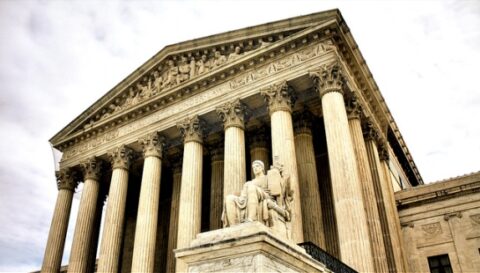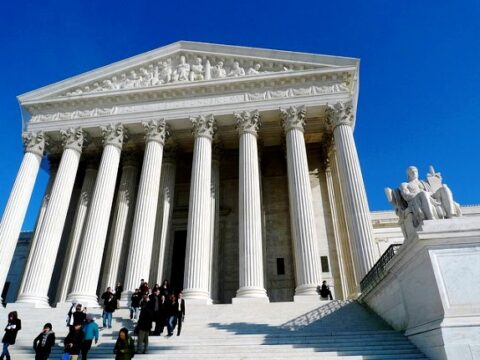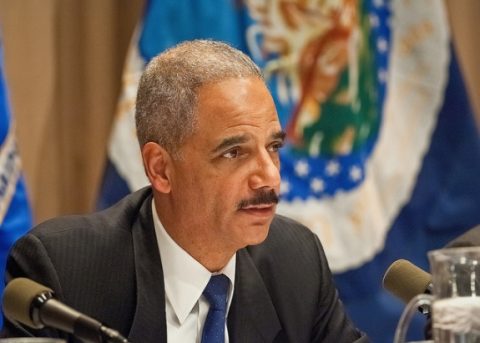Due Process and the Courts

At Supreme Court, Arizona Gets Help from the Usual Suspects
Following the filing last week of Arizona’s brief defending SB 1070, the Supreme Court has received a barrage of briefs supporting the notorious immigration law from a none-too-surprising array of suspects. As might be expected, the arguments range from the predictable (that the Obama Administration fails to enforce the immigration laws) to the provocative (that states can carry out all immigration functions short of deportation) to the preposterous (that the Constitution allows Arizona to wage war against an “invasion” of immigrants). Of course, while neither Arizona nor their lawyers can be held responsible for the arguments of outside organizations, the briefs still offer a revealing look at the identities and motivations of SB 1070’s most ardent supporters. Read More

In Fight Over SB 1070, Arizona Makes an All-Too-Familiar Case to the Supreme Court
The Supreme Court case involving Arizona SB 1070 has officially entered the home stretch. On Friday, the Justices announced that oral arguments will take place on the fourth Wednesday in April, making it the final case to be heard this term. Yesterday, Arizona filed its much-anticipated brief at the Supreme Court, laying out its legal defense of the four provisions currently blocked by a preliminary injunction. To make its case to the Court, Arizona retained renowned attorney Paul Clement, a former Solicitor General who is simultaneously handling the legal challenge to the Affordable Care Act. But while the state may have brought in new lawyers, much of its brief reads like an all-too-familiar “study” from an anti-immigration organization. Read More

It’s Time to Improve Noncitizens’ Access to Counsel
In the United States, most immigration decisions impacting noncitizens are made by immigration officials in informal proceedings far from a courtroom. While the right to an attorney (at the noncitizens’ own expense) in immigration court proceedings is widely recognized, the right to counsel in administrative settings outside of a courtroom is often overlooked or explicitly not recognized. As a result, many noncitizens are forced to navigate the immigration process alone. For those noncitizens that are represented, the Department of Homeland Security (DHS) often restricts their access to their lawyers. Read More

Federal Judge Blocks Yet Another Provision of Alabama’s Extreme Anti-Immigrant Law
As if people needed more proof that Alabama’s extreme anti-immigrant law, HB 56, is bad for the state, a federal judge temporarily blocked enforcement of yet another provision of the law this week. U.S. District Court Judge Myron Thompson temporarily enjoined enforcement of Section 30 that, as applied, requires mobile home owners to provide proof of lawful status before renewing their registration. Judge Thompson’s ruling, in which he calls Alabama’s law “discriminatorily based,” is the latest in a series of blows to the harsh law—a law that even Alabama’s own attorney general and governor find problematic. Read More

Supreme Court to Weigh in on Injunctions Against Arizona SB 1070
Earlier today, the Supreme Court announced what many supporters and opponents of Arizona SB 1070 long expected: that the Justices will themselves have the final word on the validity of the injunctions entered shortly after the law was enacted last year. Technically, the question before the Justices is simply whether four of the law’s provisions should be temporarily blocked pending resolution of a larger legal challenge. In addition, the Court will not consider claims raised in a separate lawsuit by numerous immigrants’ and civil rights groups. But in the decision it ultimately issues, the Supreme Court may well provide broad guidance about what role, if any, local police may play in enforcing federal immigration law—which could in turn affect legal challenges to copycat laws in other states, such as Alabama. Read More

Thousands Rally for Repeal of Alabama’s Extreme Anti-Immigrant Law
Thousands gathered outside the historic 16th Street Baptist Church in Birmingham, Alabama yesterday to demand the repeal of the state’s harsh anti-immigration law, HB 56. Religious, community and civil rights leaders, as well as a special Congressional delegation, urged state legislators to bring an end to Alabama’s immigration law—a law which continues to slow state businesses, separate families and drive immigrants from the state. The Congressional delegation also held an ad hoc hearing at Birmingham City Hall to hear how the controversial law is effecting state residents, especially the Latino and immigrant communities where, according to Rep. Luis Gutierrez, “the feeling of danger and despair is palpable.” One Congressional member, Rep. Al Green of Texas, commented that the law "deserves to be placed on the trash heap of history." Read More

DOJ’s Lawsuit Against South Carolina Latest Legal Challenge to State Immigration Laws
BY KAREN TUMLIN, MANAGING ATTORNEY, NATIONAL IMMIGRATION LAW CENTER Yesterday, the U.S. Department of Justice (DOJ) filed suit against South Carolina, challenging the state’s extreme anti-immigration law (SB 20). With this action, the Department of Justice charges that South Carolina, like Arizona and Alabama, have passed unconstitutional immigration laws. Civil rights groups (including the National Immigration Law Center) agree. Coalitions have filed suit in five states—Utah, Indiana, Georgia, Alabama, and South Carolina—that passed their own Arizona-inspired laws in 2011. Fortunately, most of these states have seen their new, misguided laws lose much of their bite through civil rights coalition-led legal challenges. Here’s a round-up of the status of these legal cases. Read More

Alabama Law Enforcement, Courts Implementing New Law in Different Ways Across State
As if things weren’t chaotic enough in Alabama, reports now find that law enforcement and courts vary widely on how they apply the state's new immigration law, creating different rules and consequences for individuals depending on a judge or officer’s understanding of the law. As the controversial law (HB 56) itself continues to change as it makes its way through the court system, many law enforcement officers are unclear about which provisions still stand and have yet to receive the training necessary to implement the law. Judges, too, are on different pages on how to interpret the law, meaning that an individual might receive a different ruling from one judge to the next depending on the judge's understanding of the law. Read More

Restrictionist Lawyer Reveals Long-Term Assault on Immigrant Children
Today, the head of the legal arm of one of the most notorious restrictionist groups in the nation boldly admitted his work on Alabama’s new anti-immigrant law aims to end public education for the children of immigrants. Michael Hethmon of the Immigration Reform Law Institute (IRLI), an offshoot of the Federation for American Immigration Reform (FAIR), made no bones about being the author of the education provision in HB 56—which on its face requires public schools to determine the immigration status of enrolling students and their parents, but in reality chips away at children’s ability to get an education. Read More

Federal Appeals Court Enjoins Two Provisions of Alabama’s Extreme Immigration Law
Today, the U.S. Court of Appeals for the 11th Circuit temporarily blocked two controversial provisions of Alabama’s extreme immigration law, HB 56. A federal appeals court enjoined the provision requiring public school to determine the immigration status of enrolling students and the status of their parents as… Read More
Make a contribution
Make a direct impact on the lives of immigrants.
